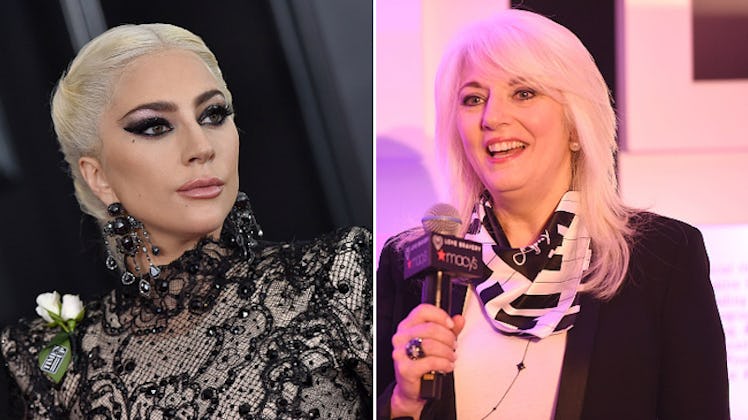
Lady Gaga's Mom Opened Up About Her Daughter's Mental Health Struggles & I'm So Emotional
As someone who has grappled with a mental health issue for most of her life, I have such a huge appreciation for celebrities who use their platforms to challenge the stigma surrounding this topic. Lady Gaga is the perfect example of this: Ever since Mother Monster first stepped into the spotlight in 2008, she’s been an advocate for mental health awareness. Though I definitely think her never-back-down attitude is a testament to her character, it’s clearly a reflection of the way she was raised, too, given that her mother, Cynthia Germanotta, wrote a personal essay about Lady Gaga, her other daughter Natali, and the mental health struggles the two sisters went through growing up. The essay, which has been published on Refinery29, paints a picture of a mom who was both accepting of her daughters' pain, and determined to help them get through it all.
Think back to the very first time you rode a bike without training wheels: How did it feel to maneuver the handles and find your balance? Maybe you fell a couple times before getting it right. I imagine parenting to be the same way, where each child is a learning experience that requires a lot of time, commitment, and the occasional fall. Raising someone who struggles with mental health issues, I would imagine, is even more of a challenge, especially when, like Germanotta, you haven’t experienced any similar health conditions yourself.
Germanotta's essay explored what it was like for her to raise teenagers struggling with mental illness, and it's both eye-opening and extremely touching.
Obviously, most parents wish the best for their children and try their hardest to give them the love and care they need. The tricky part about parenting, though, or so it seems, is that every human is a unique individual who might require a completely different kind of TLC than someone else. Unfortunately, kids don’t come with instruction manuals, so it’s more or less completely up to the parents themselves to interpret the situation and respond however they see fit. If that doesn’t work, they try again, and again, until they get it right. Germanotta wrote in her essay,
My husband and I tried our best (and still do!) to be deeply loving and attentive parents who made sure we had regular family dinners and spent hours talking with our children. But, for all of that communication, we still didn’t really understand exactly what they needed sometimes.
Lady Gaga has opened up about her struggles with anxiety and depression in the past, admitting in an interview with The Mirror that her mental health was part of the reason why she decided to take some time off after recording her album Artpop in 2013. The 32-year-old has also opened up about suffering from post-traumatic stress disorder after she was raped at 19 years old, as well as dissociation, which, she wrote in a 2016 essay for her and her mom's Born This Way Foundation, "means that my mind doesn’t want to relive the pain so 'I look off and I stare' in a glazed over state." All of these emotions are clearly very intense and very personal, and because Germanotta wasn’t quite familiar with the signs of a mental illness while she was raising her daughters, she wrote in her Refinery29 essay that she misinterpreted the depression and anxiety “for the average, if unpleasant, moodiness we all associate with teenagers.”
Germanotta said she learned how to help Lady Gaga through trial, error, and a lot of listening.
Though many of us might think moms are perfect, they aren't; they're humans, just like the rest of us, and when it comes to nurturing their children, they learn from us just as much as we learn from them. So even though Lady Gaga's mom wasn't totally in-tune at first with how her daughters were feeling, you can't really blame her, especially considering the fact that even the professionals aren't always quick to label a teenager's moody behavior as a sign of mental health issues.
"During the teenage years, mood swings are a typical part of this stage of development," Dr. Danielle Forshee, LLC, a doctor of psychology and licensed clinical social worker, tells Elite Daily. Because the teenage brain "is going through rapid cognitive growth," she explains, and their body is experiencing all kinds of hormonal fluctuations, on top of their efforts to navigate new social relationships, "professionals try not to jump to assumptions that mood swings are correlated with mental health problems."
So how do you know whether or not someone you love is experiencing something more than teenage angst? For Germanotta, figuring out what Lady Gaga and Natali were going through, and what they needed from their mother, required her to be a good listener, and to be open to learning from her daughters' experiences, rather than just going off of her own. She wrote,
My daughters have taught me how to listen more genuinely, how to ask for help when you need it, how to care for mental and physical wellness in equal measure, and a thousand other things large and small. I know, as a family, we’ll continue to learn from one another, making each other wiser and stronger by sharing lessons not just from one generation to the next, but between generations.
Mental illness isn't always easily identifiable, and that might be because it's not really talked about enough. To help moms like Germanotta, and really, anyone who wants to help others cope with mental illness, Lady Gaga recently launched the #BeKindBeTheDifference Campaign, an initiative to encourage people to become trained in what's called Mental Health First Aid.
So it turns out, Ms. G, you did an amazing job raising two incredibly strong women. You should be very proud of them, and equally as proud of yourself.